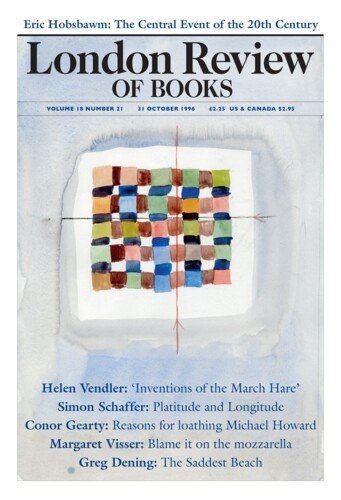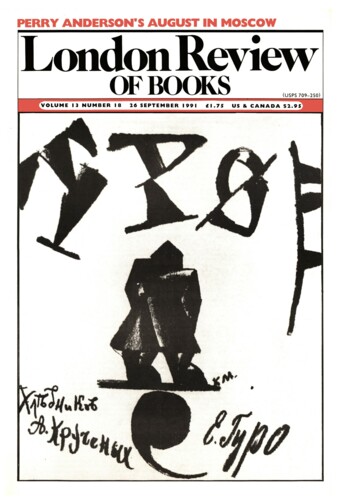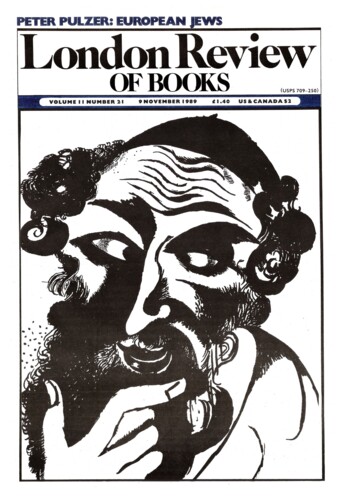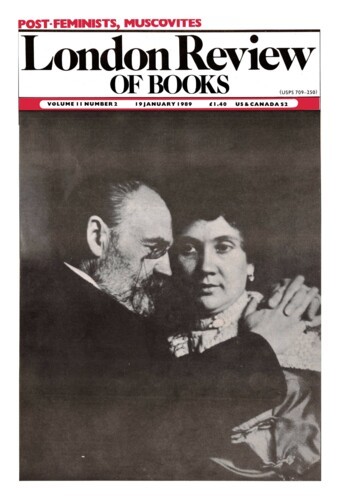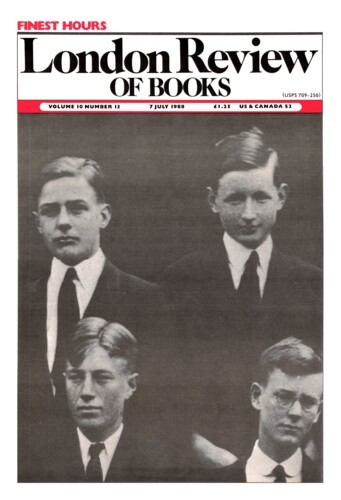Orlando Figes
Orlando Figes is a fellow in history at Trinity College, Cambridge. His Peasant Russia, Civil War will be published by Oxford.
Looting the looters
Orlando Figes, 26 September 1991
When the Bolsheviks stormed the Winter Palace on the night of 25 October 1917, they discovered one of the largest wine cellars ever known to the world. During the following days, crowds went on a drunken rampage through St Petersburg. Shops were looted, and well-to-do houses robbed. Sometimes their owners were tortured or killed for sport. Mikhail Uritsky, one of the Bolshevik leaders of the October uprising, was dragged from his sleigh, stripped naked, and left to continue his journey on foot as he returned one snowy night from a meeting with Lenin. With his warm overcoat, his pince-nez and his Jewish intellectual looks he had been mistaken for a bourgeois – a boorzhooi.
Down below, on velvet armchairs
Orlando Figes, 9 November 1989
The 215 men appointed by Nicholas II to the State Council, Russia’s highest legislative body, between 1894-1914 comprised the social and ruling élite of the old regime on the eve of its destruction. All the top aristocrats, government ministers, civil servants, judges, provincial governors, generals, admirals, church leaders and conservative academics retired to its comfortable velvet armchairs in the Mariinsky Palace. Russia’s Rulers Under the Old Regime is a ‘collective biography’ of these men. It examines their family histories, social background, education and careers, and attempts to link these with their political views on the mounting problems of government in Russia. There are separate chapters on P.N. Durnovo, the notorious Minister of Internal Affairs during the suppression of the 1905-6 Revolution; A.N. Kulomzin, the liberal-minded President of the State Council; and the two Obolensky princes, Alexander and Aleksei, super-aristocrats, part-time politicians. A final chapter considers the role of the ruling élite in the downfall of the old regime.
Diary: In Moscow
Orlando Figes, 19 January 1989
When I returned to Moscow last June, it was clear from the start that the atmosphere of the place had changed considerably since my previous visit in the winter of 1985. Even the customs officials at Sheremetevo Airport behaved differently. The enormous influx of tourists since Gorbachev came to power must have softened their attitude, for they were no longer interested in the old ritual of spilling out the contents of my bags, and trying without any knowledge of English to tell which of my bedtime novels could be deemed ‘anti-Soviet’. They simply pointed to the bag filled with books (‘any porno-journals?’), and waved me on with a smile. I remember wondering whether this meant that the pornographic treatment of women – and Western women at that – was now considered more harmful than defamation of the Soviet Government, or whether the customs officials had merely become black-marketeers in girlie magazines and videos. Six months and three trips to Moscow later, I am still not sure of the answer.’
Days of Reckoning
Orlando Figes, 7 July 1988
‘What is Stalin?’ an Old Bolshevik asked Trotsky in 1925. After a moment’s consideration came the reply: ‘the outstanding mediocrity in the Party’. Trotsky’s contempt may in part be explained by the wounds which his own pride had suffered from the growth of Stalin’s influence among the party rank and file after Lenin’s death in January 1924. On the other hand, not even Stalin’s closest allies considered intellect and charisma to be among his greatest virtues – at least, not until the Stalinist ‘cult of the personality’, which, according to Robert McNeal, didn’t really take off until 1933, four years after the consolidation of the Stalinist dictatorship.’
Pieces about Orlando Figes in the LRB
The First New War: Crimea
Geoffrey Wheatcroft, 25 August 2011
At its high tide under Suleiman the Magnificent and his immediate successors, the Ottoman Empire stretched from the Persian Gulf in the south to the Balkans in the north and reached the gates of...
Witness Protection: Communist Morality
Lewis Siegelbaum, 10 April 2008
The NKVD came for Angelina and Nelly Bushueva’s father in 1937, when they were one and three years old. Nine months later, the sisters were sent to different orphanages when their mother,...
His proudest moment had been when two peasants bowed to the ground, Russian style, and thanked him for his book: Great Russians
Joseph Frank, 28 November 2002
The title of Orlando Figes’s impressively wide-ranging book refers to a scene in War and Peace in which Natasha Rostov, the finest product of the European education favoured by the Russian...
Out of the Great Dark Whale
Eric Hobsbawm, 31 October 1996
The great revolutions of the modern world never cease to be controversial, inside or outside their countries, as the 200th anniversary of the French Revolution recently demonstrated. In France...
Read anywhere with the London Review of Books app, available now from the App Store for Apple devices, Google Play for Android devices and Amazon for your Kindle Fire.
Sign up to our newsletter
For highlights from the latest issue, our archive and the blog, as well as news, events and exclusive promotions.
